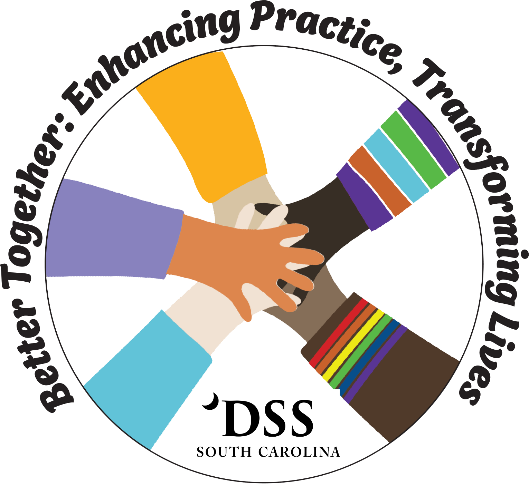The Kinship Caregivers Role
When a child is placed with a kinship/fictive caregiver through the South Carolina Department of Social Services, the caretaker becomes a vital member with of the decision-making team which includes: DSS professionals, providers, biological parents, etc. The collaboration of members shares and provide information that will help the caregiver and child to be successful in the care of the child by meeting their needs by creating a safe and consistent environment for the child.
In your role as the kinship caregiver, you are responsible for:
- Meeting the child’s basic emotional, financial, educational, physical and medical needs
- Making sure the child keeps positive connections to their friends, family, and community
- Attending meetings and court appearances (when applicable)
- Taking the child to medical, school and counseling appointments consistently and notifying the SCDSS case manager of any changes.
- Working with the child’s parents, which may include a parent who does not have custody of the child
- Helping with visitation between the child, parents and sibling
Parents, visitation and keeping family connections
SCDSS works to strengthen relationships between children and their parents by continuing the bond the child has with their siblings. The agency attempts to place sibling in the same home or through regular visitation. Kinship Caregivers caring for the child should work with biological parents to keep the family connected; unless that’s prohibited by a court order.
In most formal kinship care arrangements, children have scheduled visitation with parents and other family members. Each case is different but if it is safe and appropriate, children should visit with their parents as often as possible. Kinship Caregivers should talk with their SCDSS case manager about the visitation plan and if there are restrictions:
- Follow the requirements outlined by the SCDSS case manager on how visits should be supervised and how often visits should happen verbally and on DSS form 37562 (The South Carolina Kinship Caregiver Agreement). The form has a section that outlines visitation and other contacts such as: Clear outline of the arrangements for visits, level of supervision required, restrictions if any, and maintaining contact with the family and others. The SCDSS will keep a copy and provide a copy to the caregiver to act in the best interest of the children medically, educationally, and medically.
- In certain cases, the Family Court will make visitation plans that must be followed. Kinship Caregivers will need to review your court order with the SCDSS caseworker to ensure all guidelines outlined are being executed.
Visitation in kinship care may feel awkward because of the change in the relationship the caregiver has with the child and the parents.
- It is important to establish and maintain healthy boundaries by being inclusive by sharing information with the biological family, providing updates, pictures, etc. and making sure they understand the limitations when needed to maintain a healthy and safe environment.
- Caregivers must follow the visitation plan even if it feels difficult.
- Talk with assigned SCDSS case manager about what’s required and what problems you anticipate or encounter with visits.
It’s beneficial for the child, kinship caregiver and biological parent to remain positive when working together. SCDSS encourages kinship caregivers to provide emotional support, guidance, and model good parenting. Honest, open and frequent communication with the child’s parent is encouraged. Communication is part of a kinship caregiver’s responsibilities. Please keep in mind, if the biological parents still have their legal rights, it is important to get the parent’s permission for any medical procedure or surgeries.
Confidentiality
When SCDSS is involved, kinship caregivers must, generally, keep information they learn about the child and the child’s family private, only sharing information when it is necessary to meet the child’s needs. Kinship Caregivers can give information about the needs and behaviors of the child to doctors, counselors, teachers and other providers when the child is getting services to meet medical, educational, mental, or social needs.
If you’re not sure whether you can share certain information, contact the assigned SCDSS case manager, their supervisor or the Kinship Care Coordinator for your region. Click here for regional contact information.
Emergency situations
Emergencies can happen at any time. In an emergency:
- First, call 9-1-1 or seek out emergency care if the child’s health or safety is in danger.
- Next, if you’re working with SCDSS, let the assigned case manager know what’s going as soon as possible. Between 8:30am and 5:00pm, Monday through Friday, you can call your local county office.
- For after-hours emergencies (including weekends, holidays or during bad weather) each county has a procedure that should be followed. Please use your emergency contact.
- Kinship Caregivers must let parents know about any serious illness, accident or injury.
If SCDSS is involved with the child, Kinship Caregivers should get emergency contact information from the SCDSS case manager.
"People tell me I’m a saint for taking her in. I’m not a saint. I’m just a person caring for her family.” -Sarah Walker, who provides kinship care for a niece

